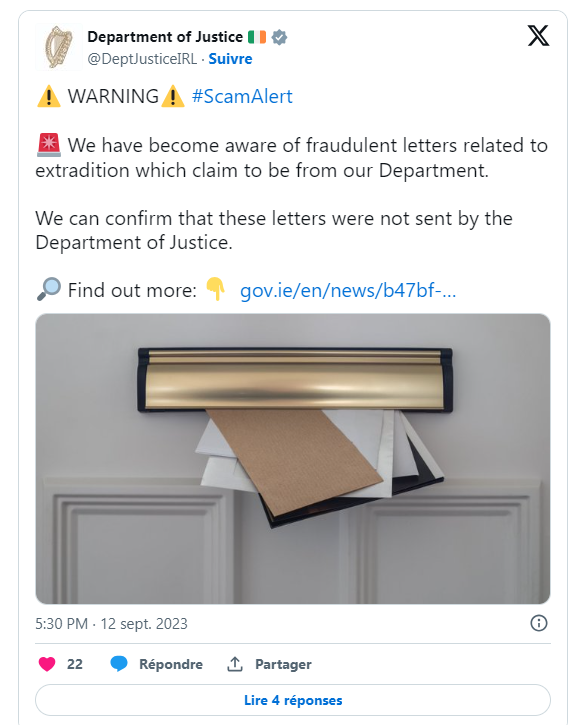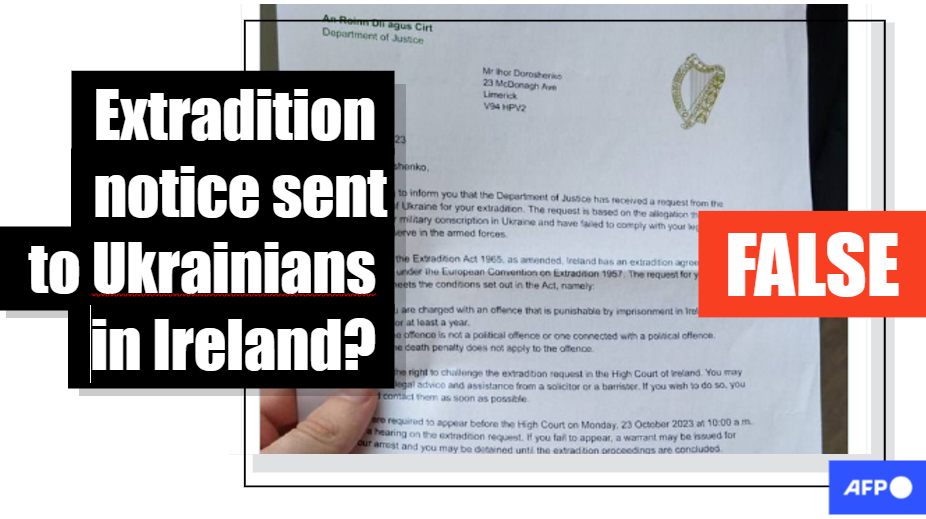According to official Irish statistics published on June 13, 2023, 78% of 84,600 arrivals are women and children, but the remaining 22%, or around seventeen thousand, are men. Ukraine has been battling Russian troops in a slow-moving counter-offensive that it launched in June, more than a year after Russia invaded. The counter-offensive has seen Ukraine's army come up against powerful Russian defensive lines involving trenches, minefields, and tank traps. "They have started sending extradition notices to Ukrainians," reads a claim repeatedly posted to X (formerly Twitter) and Facebook (here, here and here) since September 10, 2023. Published alongside is a photo of the alleged document.
The letter, dated September 7, is addressed to a certain “Mr Ihor Doroshenko” and features the department of justice in its header. It reads: “We are writing to inform you that the Department of Justice has received a request from the Government of Ukraine for your extradition.”

Similar posts were shared on social media in various other languages including English, Polish and Czech. Most of the posts were shared by accounts that are openly pro-Russian.
At the start of Russia’s invasion, the Ukrainian army was bolstered by an influx of volunteers wanting to fight for the cause, but now a year and a half later, after suffering losses, the country has been forced to rely more on conscription, according to AFP.
With that in mind, Ukrainian authorities have taken a tough stance towards those looking to avoid going to war. In late July, a senior former military official was detained for suspected corruption. Investigators accused Yevgen Borisov of accepting bribes in return for exempting some people from being mobilised in the army.
‘Fraudulent’
Yet, the document that we are verifying here, which appears to show that the country sent extradition notices to its nationals in Ireland, is fake.
Contacted by AFP on September 13, Ireland’s department of justice said it had never sent anything of the sort, calling the document “fraudulent”.
The department also warned residents of Ireland about it in a press release.
“If anyone is unsure of the authenticity of any correspondence they receive purporting to be from the Department of Justice, they can contact the Department on 1800 221 227,” the department said.

“Scams are common. They can happen at any time. Some of the most common types of scams involve the use of fake emails, calls or texts pretending to be from real companies and organisations. We urge people to be extremely cautious and to not engage or share any personal information,” it added.
Military offences excluded from extradition convention
AFP also spoke with two experts in EU law who pointed out that the letter shared on social media lacked legal credibility.
The fake document claims that Ukrainian nationals in Ireland can be subject to an extradition request for failing “to comply with your legal obligation to serve in the armed forces”.
Men of conscription age have been banned from leaving Ukraine since February 2022, when the president ordered a full military mobilisation in response to Russia’s invasion.
To support its claim, the letter makes reference to two legal documents: Ireland’s 1965 Extradition Act and the European Convention on Extradition from 1957.
Both documents are real. The first is a reference framework for extradition issues in Ireland, while the other concerns all member states of the Council of Europe (not to be confused with the European Union). According to its website, the institution’s mission is “to promote democracy, human rights and the rule of law across Europe and beyond”. The Council of Europe has 46 members states, including all 27 EU nations.
These documents, however, “do not provide for an extradition request on the grounds of such things as desertion or a refusal to take part in compulsory military service,” according to Araceli Turmo, an associate professor in EU law at Nantes University.
“Under the 1957 European Convention on Extradition, a person cannot be extradited for offences of a purely military nature,” she told AFP on September 13.
“If a soldier commits murder and there’s an extradition request, the fact that he’s military does not protect him. However, if he commits an offence that only exists under military law, this convention cannot be used to formulate an extradition request,” she added.
Carolyn Moser, a visiting professor at Sciences Po, recalled that the convention “stipulates under article 4 that extraditions for military offences are excluded from its scope of application”.

“If Ukraine did indeed want a Council of Europe country to send back its nationals, it would have to base its request on a criminal offence,” the expert in EU law told AFP on September 14.
The same goes for Irish law. Article 4 of the Extradition Act of 1965 stipulates that “extradition shall not be granted for offences under military law which are not offences under ordinary criminal law”.

Outside of this legal framework, could a bilateral accord provide for the extradition of Ukrainian nationals to Ukraine? Not really, according to Moser: “If there is a framework convention, you cannot conclude a bilateral agreement which provides for the contrary. Otherwise, you would have two conventions that contradict one another.”
Extradition for a criminal offence?
Ukrainian officials themselves have weighed in on the extradition issue. Davyd Arakhamia, leader of the parliamentary faction of the president’s party, said in September that Ukrainian men of military age who left Ukraine illegally could be extradited back to their homeland.
“Ukraine is apparently considering asking other countries to extradite men who are still of military age,” said Moser, adding however that it would be “on the basis of criminal offences” and not because they must respect conscription, as the fake letter claims.
Despite Ukraine’s full military mobilisation, many men of military age have still managed to leave the country. “But to cross the border, they had to prove that they were exempted from military service. So some may have shown forged documents or certificates. If Ukraine ever wanted to submit an extradition request, it would be on this basis, namely a corruption offence or the falsification of documents,” Moser said.
But even if Ukraine were to go for it, it “would have to gather a sufficient amount of evidence to show that the wanted person had committed an offence or even a crime,” she added. “For example, it would have to show that the person bribed a border official or bribed a doctor for a forged certificate, etc. The offence would also have to be punishable in Ireland: reciprocity is generally a prerequisite for extradition.”
“Ukraine would then have to make a formal request for every wanted person, supported by a dossier of evidence. The Irish authorities could then launch into action,” Moser added.
Turmo pointed out yet another nuance.
“Under no circumstances are collective extraditions authorised in the European Convention on Extradition. It has to be a specific person for an act that he or she committed. It is not possible to request the extradition of an entire group,” she said.
The question of whether to extradite Ukrainian men of military age “also has an important political dimension”, Moser said. “The courts must take it up but the final decision to extradite or not is taken by the justice ministry which, for political reasons, may not give the go ahead. However, that would have diplomatic implications,” she added.
Emilie BERAUD
AFP France
Translated by Anna Maria JAKUBEK

- Home
- About AFP
- How we work
- Editorial & Ethical standards
- Fact-Checking Stylebook
- Meet the team
- Training
- Subscribe
- Contact
- Corrections
Copyright © AFP 2017-2023. All rights reserved. Users can access and consult this website and use the share features available for personal, private, and non-commercial purposes. Any other use, in particular any reproduction, communication to the public or distribution of the content of this website, in whole or in part, for any other purpose and/or by any other means, without a specific licence agreement signed with AFP, is strictly prohibited. The subject matter depicted or included via links within the Fact Checking content is provided to the extent necessary for correct understanding of the verification of the information concerned. AFP has not obtained any rights from the authors or copyright owners of this third party content and shall incur no liability in this regard. AFP and its logo are registered trademarks.
